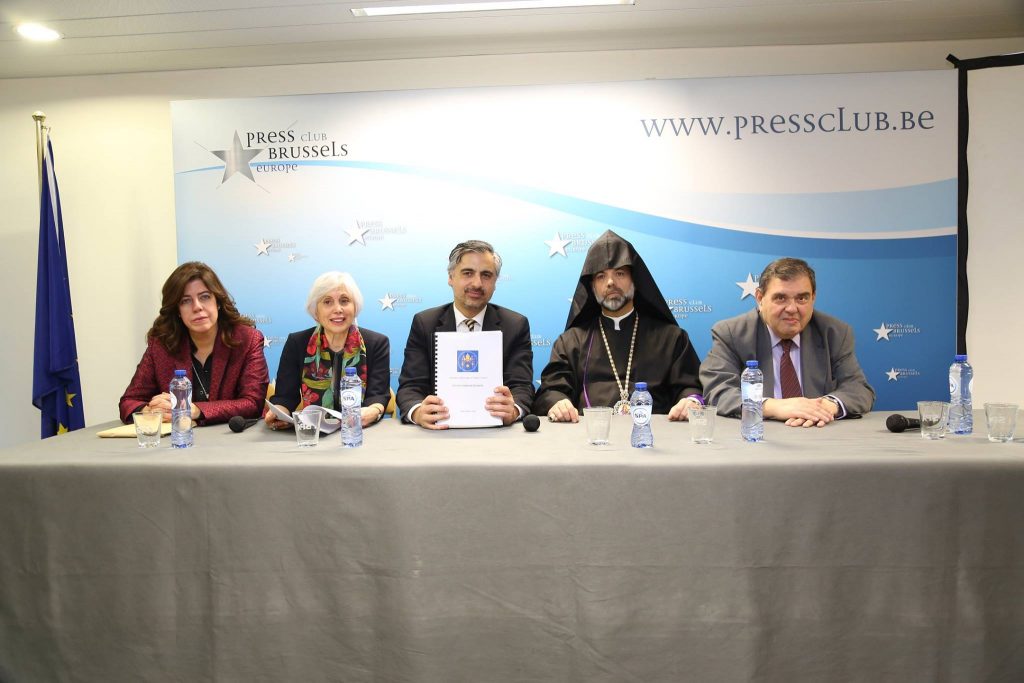BRUSSELS, Belgium (A.W.) – On Dec. 7, the Armenian Catholicosate of Cilicia officially filed the application to reclaim the historical headquarters of the Holy See of the Great House of Cilicia from Turkey to the European Court of Human Rights (ECHR).

(L to R) Professor of international law Nora Bayrakdarian, Catholicosate team coordinator and adjunct professor of religion and ethics Teny Pirri-Simonian, international lawyer and professor at McGill University Payam Akhavan, representative of Catholicos Aram I Archbishop Kegham Khatcherian, EAFJD President Kaspar Karampetian (Photo: EAFJD)
Following its submission, a press conference took place, which featured European Armenian Federation for Justice and Democracy (EAFJD) President Kaspar Karampetian, Representative of Catholicos Aram I Archbishop Kegham Khatcherian, professor of international law Nora Bayrakdarian, Catholicosate team coordinator and adjunct professor of religion and ethics Teny Pirri-Simonian, and international lawyer and professor at McGill University Payam Akhavan.
After Archbishop Khatcherian conveyed the message of Catholicos Aram I, Akhavan discussed the importance of the claim and how the case was about the property rights of the church and the right of religious worship. “[The case] entails the right of the church to restore ownership, possession, use, and restoration of the monastery for the purposes of religious worship,” Akhavan said in his address.
Pakhavan said that the case was inspired by the 2011 conciliatory remarks made by the Turkish government, which invited religious minorities to return to Turkey. These comments encouraged Aram I to send a letter in 2011 and 2013 demanding to return the estates of the Sis Catholicosate, however the letters remained unanswered.
A case was then filed to the Constitutional Court of Turkey, however the court decided not to proceed with the case and banned the church from having access to property records. Pakhavan explained how the current status of the property was just a pile of rubble, but if given under the right ownership, could become a cultural attraction and a center for religious worship in the Middle East. “Anticipation will take several months. We have waited 100 years, and are willing to wait several months more for justice,” said Pakhavan.
Meanwhile, Dr. Pirri-Simonian addressed two significant attributions of the case, which included its value of promoting multiculturalism and inter-religious dialogue in the Middle East and encouraging Islamized Armenians to come forward and reveal who they are.
Following the remarks by the distinguished speakers, a variety of questions were asked regarding the precedence the case can set for other minorities; whether this will contribute to the political game between the European Union and Turkey; and if the counsel was prepared to accept a ruling from the court that did not fully comply with their expectations.
Pakhavan said that given their arguments, he would be very surprised if the court denied the right to the possession and use of the property. “The main claim is property rights under Article 1 of Protocol 1 to the European Convention and the supplementary claim is to the right of religious worship… I would be very surprised if the European Court of Human Rights would say that we are going to deny the right of the Christian minority, which has specific rights under the Lausanne treaty to go to a place of worship,” said Pakhavan.
Several other factors, including the current election going on for a Patriarchate in Istanbul, details into property rights, and the lasting impact it could have in the Middle East were discussed as well.
Source: Armenian Weekly
Link: Cilicia Catholicosate Officially Appeals to European Court of Human Rights
